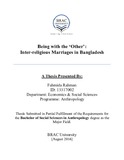| dc.contributor.advisor | Siddiqi, Dr Dina M | |
| dc.contributor.author | Rahman, Fahmida | |
| dc.date.accessioned | 2017-08-09T05:59:52Z | |
| dc.date.available | 2017-08-09T05:59:52Z | |
| dc.date.copyright | 2016 | |
| dc.date.issued | 2016-08 | |
| dc.identifier.other | ID 13317002 | |
| dc.identifier.uri | http://hdl.handle.net/10361/8393 | |
| dc.description | This thesis is submitted in a partial fulfillment of the requirements for the degree of Bachelor of Social Science in Anthropology, 2016. | en_US |
| dc.description | Cataloged from PDF version of thesis. | |
| dc.description | Includes bibliographical references (page 38-39). | |
| dc.description.abstract | Inter-religious marriage is one of the rarest research topics seen in Bangladesh till today.
However, „rare research‟ does not mean that such marriages are not taking place. In Bangladesh,
inter-religious marriage is rare but present.
There are cases where a person falls in love with someone not from their own caste or religion.
However, in such cases the predominant reaction seen among families is due to the difference in
the social and cultural institution that such marriage will be bringing upon.
My thesis centers on ethnography of such a family who got their child married into a family of a
different religion. This is, however, completely an anomaly and not tends to be even heard of in a
country who, on the one hand claims to have its own state religion, on the other, is labeled as
“secular country”. The issue has particularly drawn my attention because marriage in South Asia
is not only about two individuals but about families and other social and cultural institutions;
hence, marrying in family of different religion is itself a dilemma if no one is converting. Among
all these dilemmas and confusions and going against the social construction, why would any
family, on purpose do such act? What could be the social/political/personal motive behind it?
While putting vehement focus on inter-religious marriage, I would also like to analyze/explore
these issues with inter-caste marriages that take place among the Hindu believers. This is
because; inter-caste marriage has already led to many “honour” killings and is an ongoing
situation till today in South Asia. Up to some extent, inter-religious marriage may do lead to such
acts as well. Nonetheless, as my thesis will be ethnography of an “arranged inter-religious”
marriage, before going on to the main ethnography, I will like to cover some historical issues like
what marriage in South Asia means and it takes place? The legal ramification if one wants to
perform inter-religious marriage.
I hope at the end of my thesis, my findings will reflect some solutions on diminishing the blurred
social construction of “religious” marriage and bring about some flexibility among the marriage
laws in future. | en_US |
| dc.description.statementofresponsibility | Fahmida Rahman | |
| dc.format.extent | 57 pages. | |
| dc.language.iso | en | en_US |
| dc.publisher | BRAC Univeristy | en_US |
| dc.rights | BRAC University thesis reports are protected by copyright. They may be viewed from this source for any purpose, but reproduction or distribution in any format is prohibited without written permission. | |
| dc.subject | Marriage | en_US |
| dc.subject | Inter-religious marriage | en_US |
| dc.title | Being with the ‘Other’: inter-religious marriages in Bangladesh | en_US |
| dc.type | Thesis | en_US |
| dc.contributor.department | Department of Economics and Social Sciences, BRAC University | |
| dc.description.degree | BSS in Anthropology | |

